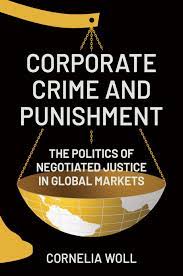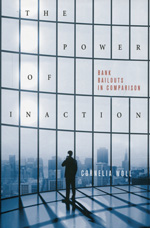Corporate crime and punishment
the politics of negotiated justice in global markets
- ISBN: 9780691250328
- Editorial: Princeton University Press
- Fecha de la edición: 2024
- Lugar de la edición: Princeton (NJ). Estados Unidos de Norteamérica
- Encuadernación: Cartoné
- Medidas: 24 cm
- Nº Pág.: 248
- Idiomas: Inglés

The geopolitics of American law enforcement and how it changed corporate criminal accountability in other countries
Over the past decade, many of the world's biggest companies have found themselves embroiled in legal disputes over corruption, fraud, environmental damage, tax evasion, or sanction violations. Corporations including Volkswagen, BP, and Credit Suisse have paid record-breaking fines. Many critics of globalization and corporate impunity cheer this turn toward accountability. Others, however, question American dominance in legal battles that seem to impose domestic legal norms beyond national boundaries. In this book, Cornelia Woll examines the politics of American corporate criminal law's extraterritorial reach. As governments abroad seek to respond to US law enforcement actions against their companies, they turn to flexible legal instruments that allow prosecutors to settle a case rather than bring it to court. With her analysis of the international and domestic politics of law enforcement targeting big business, Woll traces the rise of what she calls "negotiated corporate justice" in global markets.
Woll charts the path to this shift through case studies of geopolitical tensions and accusations of "economic lawfare," pitting the United States against the European Union, China, and Japan. She then examines the reactions to the new legal landscape, describing institutional changes in the common law countries of the United Kingdom and Canada and the civil law countries of France, Brazil, and Germany. Through an insightful interdisciplinary analysis of how the prosecution of corporate crime has evolved in the twenty-first century, Woll demonstrates the profound transformation of the relationship between states and private actors in world markets, showing that law is part of economic statecraft in the connected global economy.
1. Sites of Conflict
An End to Corporate Impunity or American Imperialism?
How Extraterritorial Law Enforcement Leads to the Rise of Negotiated Corporate Justice
Market Power and Legal Irritants
Unfolding the Argument
2. The Moral Economy of Corporate Justice
Legal Change across Boundaries
Legal Traditions and Corporate Criminality
Moral Economies
Conclusion
3. Corporate Prosecutions in the United States
The Evolution of Corporate Criminal Enforcement
Overview and Trends Global Enforcement-Home Advantage
Possible Explanations for Home Bias
Conclusion
4. Extraterritoriality through Market Power
Law and Territory
Unilateral Expansion of Jurisdiction
The Long Arm of American Law
Conclusion
5. Economic Lawfare
Economic Rivalries in an Interdependent World
Economic Lawfare in Support of Geoeconomic Strategies
Targeting Companies to Win Geoeconomic Advantage
Conclusion
6. The Rise of Negotiated Justice
Institutional Change through Irritation
Negotiated Corporate Justice
Comparing Institutional Change Varieties of Negotiated Justice
7. Crime and Punishment in the Global Economy
Globalization as the Competitive Transformation of Corporate Justice
The Challenges of Negotiated Corporate Justice
Lessons from Abroad
Geopolitics vs. Democratic Legitimacy







